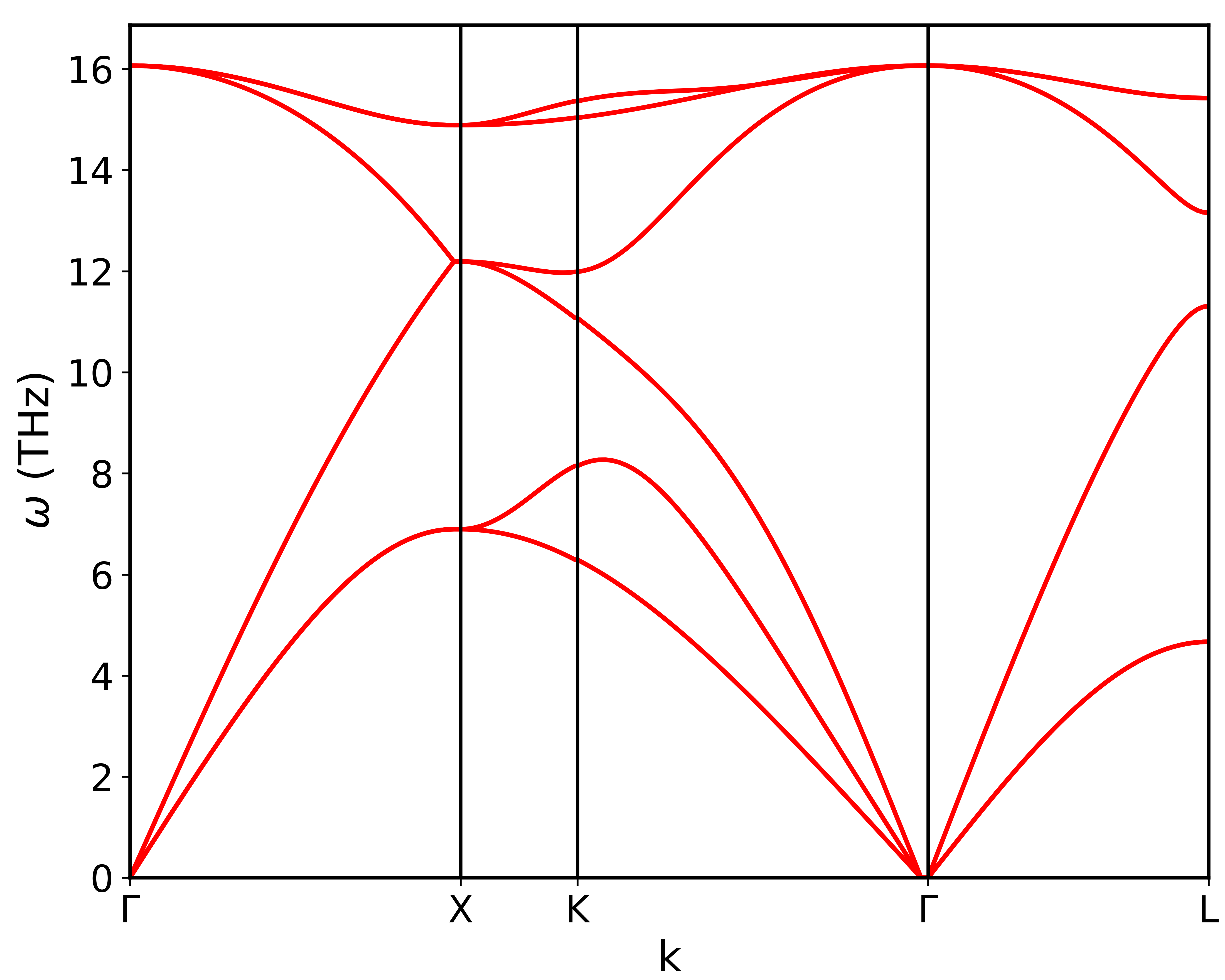Phonon Dispersion Calculation of Silicon Using QE
Phonon dispersion in Quantum Espresso is calculated using the ph.x program, based on Density Functional Perturbation Theory (DFPT). This article demonstrates the calculation process using monocrystalline silicon (Si) as an example.
Step 1 pw.x
Perform SCF calculation using pw.x.
- SCF Input File (
pw.scf.Si.in)
&control
calculation = 'scf'
restart_mode = 'from_scratch'
pseudo_dir = './pseudos/'
outdir = './out/'
prefix = 'Si'
/
&system
ibrav = 2
celldm(1) = 10.20
nat = 2
ntyp = 1
ecutwfc = 16
/
&electrons
mixing_mode = 'plain'
mixing_beta = 0.7
conv_thr = 1.0e-8
/
ATOMIC_SPECIES
Si 28.0855 Si.vbc.UPF
ATOMIC_POSITIONS
Si 0.00 0.00 0.00
Si 0.25 0.25 0.25
K_POINTS {automatic}
8 8 8 0 0 0
- Execute SCF Calculation
mpirun -np 4 pw.x -i pw.scf.Si.in > pw.scf.Si.out
Step 2 ph.x
Compute dynamical matrices on a uniform q-point grid using ph.x.
- Input File (
ph.Si.in)
&INPUTPH
tr2_ph = 1d-14
amass(1) = 28.0855
ldisp = .true.
nq1 = 4
nq2 = 4
nq3 = 4
outdir = './out/'
prefix = 'Si'
fildyn = 'Si.dyn'
/
- Execute Calculation
mpirun -np 4 ph.x -i ph.Si.in > ph.Si.out
- Output Files
Si.dyn0 contains the coordinates of the q-point grid.
Si.dyn1-N contains force constants ( C(q_n) ), where ( n = 1,…N ), with ( N ) being the number of irreducible q-points in the Brillouin zone.
Step 3 q2r.x
Use q2r.x to perform an inverse Fourier transform of the force constants in q-space to obtain real-space force constants.
- Input File (
q2r.Si.in)
&INPUT
fildyn = 'Si.dyn'
zasr = 'simple'
flfrc = 'Si444.fc'
/
- Execute Calculation
mpirun -np 4 q2r.x -i q2r.Si.in > q2r.Si.out
- Output File
Si444.fc contains real-space force constants for a 4×4×4 supercell.
Step 4 matdyn.x
Use matdyn.x to perform a Fourier transform on real-space components to obtain the dynamical matrix and eigenvalues (frequencies) at arbitrary q-points.
- Input File (
matdyn.Si.in)
&INPUT
asr = 'simple'
flfrc = 'Si444.fc'
flfrq = 'Si.freq'
flvec = 'Si.modes'
q_in_band_form = .true.
/
6
0.000 0.000 0.000 50
0.500 0.000 0.500 50
0.625 0.250 0.625 1
0.375 0.375 0.750 50
0.000 0.000 0.000 50
0.500 0.500 0.500 1
- Execute Calculation
mpirun -np 4 matdyn.x -i matdyn.Si.in > matdyn.Si.out
Then, use the resulting Si.freq.gp file to generate plots.

Enjoy Reading This Article?
Here are some more articles you might like to read next: